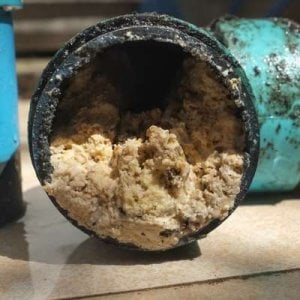Sydney Water warns homeowners of common food disposal mistake
By
Danielle F.
- Replies 4
In the comfort of our homes, we often overlook the small habits that can lead to big problems.
A water company pointed out a common household mistake that has caused nightmares for many Aussies, and it's time we talk about it.
Sydney Water warned about disposing of fats, oils, and grease on kitchen sinks.
While it is a quick solution to eliminate cooking by-products, this practice may lead to severe blockages in our plumbing systems, creating what is known as 'fatbergs'.
These blockages are a headache for homeowners and pose significant health and environmental risks.
Sydney Water highlighted the gravity of the situation with a confronting image of a clogged pipe choked with hardened grease and other waste materials.
When cooking oils and fats are poured down the sink, they cool and solidify in the wastewater pipes.
They then combine with other non-biodegradable items like wet wipes, cotton buds, and hair, forming solid masses that can cause overflows.
These overflows are more than just a plumbing issue; they can lead to wastewater backing up and spilling into homes, backyards, and local waterways.
The environmental impact is significant as pollutants enter rivers and oceans—harming wildlife and disrupting ecosystems.
Western Sydney University's Ian Wright warned that blocked sewers could jeopardise public health as people—including children—may come in contact with raw sewage.
In a previous article, a tradie also pointed out the consequences of improper waste disposal, as he met a stinky surprise while cleaning pipes.
The financial cost of these blockages is also considerable.
The problem contributes to a $15 to 20 million expense annually in NSW alone. Similar issues also happen nationwide.
Homeowners may face hefty plumbing bills to fix blocked drains.
To prevent these 'fatbergs', Sydney Water advised residents to adopt effective waste disposal practices:
It's a simple act of responsibility that goes a long way.
Remember, it's not just about avoiding a plumbing nightmare; it's about safeguarding our beloved homes and environment for future generations.

Do you have any waste disposal tips to keep your homes clean and safe? Share your tips and experiences in the comments below.
A water company pointed out a common household mistake that has caused nightmares for many Aussies, and it's time we talk about it.
Sydney Water warned about disposing of fats, oils, and grease on kitchen sinks.
While it is a quick solution to eliminate cooking by-products, this practice may lead to severe blockages in our plumbing systems, creating what is known as 'fatbergs'.
These blockages are a headache for homeowners and pose significant health and environmental risks.
Sydney Water highlighted the gravity of the situation with a confronting image of a clogged pipe choked with hardened grease and other waste materials.
When cooking oils and fats are poured down the sink, they cool and solidify in the wastewater pipes.
They then combine with other non-biodegradable items like wet wipes, cotton buds, and hair, forming solid masses that can cause overflows.
These overflows are more than just a plumbing issue; they can lead to wastewater backing up and spilling into homes, backyards, and local waterways.
The environmental impact is significant as pollutants enter rivers and oceans—harming wildlife and disrupting ecosystems.
Western Sydney University's Ian Wright warned that blocked sewers could jeopardise public health as people—including children—may come in contact with raw sewage.
In a previous article, a tradie also pointed out the consequences of improper waste disposal, as he met a stinky surprise while cleaning pipes.
The financial cost of these blockages is also considerable.
The problem contributes to a $15 to 20 million expense annually in NSW alone. Similar issues also happen nationwide.
Homeowners may face hefty plumbing bills to fix blocked drains.
To prevent these 'fatbergs', Sydney Water advised residents to adopt effective waste disposal practices:
- Scrape food leftovers into the bin or compost.
- Use a paper towel to wipe greasy pans and dishes to remove excess oil.
- Instead of pouring used oil or fatty liquids down the drain, place them in a container and dispose of them in the bin.
- Add a sink strainer to catch small pieces of food to prevent them from entering plumbing systems.
It's a simple act of responsibility that goes a long way.
Remember, it's not just about avoiding a plumbing nightmare; it's about safeguarding our beloved homes and environment for future generations.
Key Takeaways
- Aussies were warned about the damage caused by improper food disposal.
- Items such as grease, fats, and oils can lead to 'fatbergs' that block pipes and cause hazardous wastewater overflows.
- Sydney Water shared an image showing the impacts of grease and other waste build-up inside a blocked pipe.
- To prevent these issues, Sydney Water emphasised properly disposing of food waste and oils, using a sink strainer, and wiping greasy dishes before washing.








